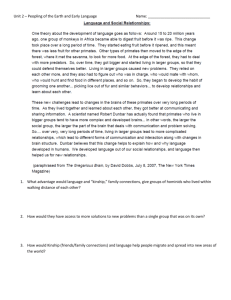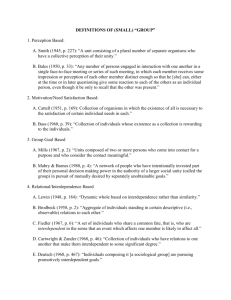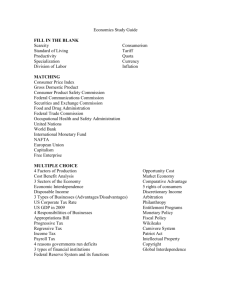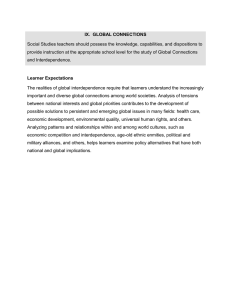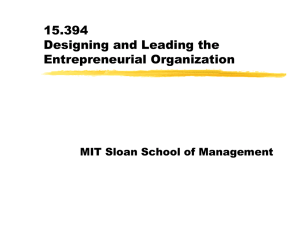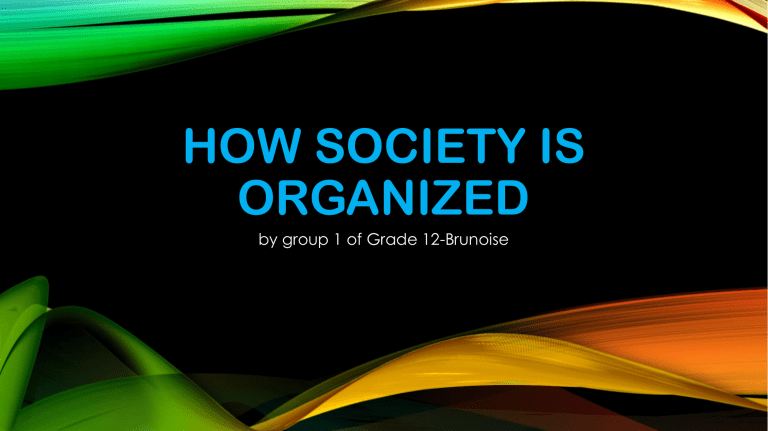
HOW SOCIETY IS ORGANIZED by group 1 of Grade 12-Brunoise WHAT IS A SOCIETY? •Society is an entity that allows individuality yet provides space to other individuals and groups to pursue mutual goals and aspirations. GROUPS WITHIN SOCIETY • A social group is a collection of individuals who have relations with one another that make them interdependent to some significant degree. • Interdependence is a necessary condition that exists within social groups because it is what enables its members to pursue shared goals or promote common values and principles. • The presence of mutual interdependent is what differentiates a social group from a social aggregate. A social aggregate is a mere collection of people in the same place at the same time and does not necessarily influence an individual’s social actions due to the lack of direct interaction and interdependence with the people composing it. PRIMARY AND SECONDARY GROUPS PRIMARY GROUP • PRIMARY GROUP - is a small, intimate, and less specialize group whose members engage in face-to-face and emotion-based interactions over an extended period of time. • interdependence is characterized by deep and profound relationship with each other. • examples primary group are family, close friends, work-related peers, classmates and church groups. • every society is comprised of various primary groups that are responsible for the continual social development of its members. PRIMARY GROUPS • it is within these group where an individual experience his or her initial encounter with social affinity and belonging. • it is within these groups that as individual establishes and defines his or her identity, values, ideals,and aspirations. • his or her members of these group serve as his or her agents of socialization. • his or her basic idea on the different facets of his or her society are significantly shaped by the members of his or her primary groups. • in the Philippines the primary group affiliation of Filipinos is based on kinship ties. • through kinship young Filipinos realize the great importance our culture assigns to the family and its extended nature. • we recognize bilineal kinship which traces lineage from both parents. we put emphasis on the place of origin of both his or her parents. which sometimes build instant affinity with people they do not know but either share a family name or place of origin. SECONDARY GROUP • SECONDARY GROUP - in contrast are large, less intimate and more • • • • • specialized group where members engage in impersonal and objective-oriented relationship for a limited time the level of interaction and interdependence within the secondary groups is not deep and significant. the impersonal nature of interaction between members of secondary groups allows to treat others as merely a means to achieve his or her immediate objectives. recognize that their membership to these groups is less intrinsic and more instrumental. mutual benefit, rather than emotional affinity, becomes the driving force that compel individuals to stay together in a secondary group. example for these is the work place , professional relationship between lawyers and its clients, and a corporation that has hundreds of employees, stockholders and shareholders. SECONDARY GROUPS EMILE DURKHEIM 1858-1917 • french social scientist • founder of the french school of sociology. • argued that the shift of from traditional to modern society will impact how will individuals relate to one another. • he developed theories of social structure that include functionalism, the division of labor and anomie • pioneered the use of of statistics in sociology and argued that society is a moral entity, not just a group of human beings acting in their rational selfinterest which are important contributions to sociology. • a relevant approach in understanding the characteristics of social group SELF CATEGORIZATION • proposes that the people's appreciation of THEORY their group membership is influenced by their perception towards people who are not members of their group IN- GROUPS • a group to which one belongs and with which one feels a sense of identity OUT GROUP • a group to which one does not belong and to which he or she may feel a sense of competitiveness or hostility REFERENCE GROUPS • is a social group that we are use as a standard of comparison for ourselves regarded of whether or not we are part of the group NETWORKS • a social network is a series or web of weak social ties involving people or groups of individuals connected to each other, such as through friendship, family, business relationship, academic institutions,religious organizations and sociopolitical clubs. THANK YOU !!! • prepare a 1/4 sheet of paper for a short quiz!!!

